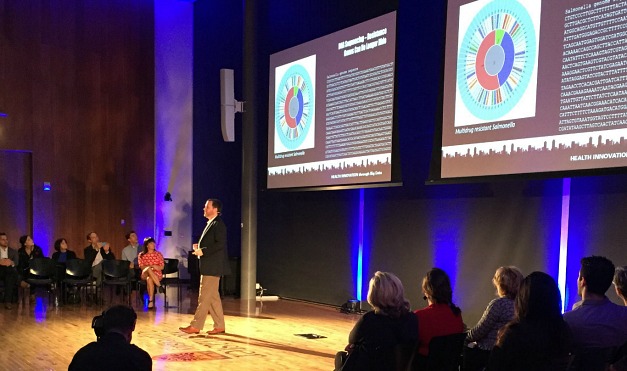New approaches to understanding antimicrobial resistance
Background

Dr. Andrew G. McArthur
Antimicrobial resistance (AMR) poses an enormous threat to the health of Canadians. The overuse and misuse of antimicrobials, such as antibiotics, has led to the emergence of ‘super bug' strains of once treatable infectious diseases. More than 18,000 hospitalized Canadians acquire drug-resistant infections each year and this number continues to rise. Because of this, AMR is a national and international research priority.
To better understand AMR, researchers need to know which genes contribute to resistance, and which ones have the potential to become resistant. An online repository, called the Comprehensive Antibiotic Resistance Database (CARD), developed at McMaster University by Drs. Andrew McArthur and Gerry Wright, has been created to track and monitor these AMR-linked genes. Dr. McArthur, the inaugural Cisco Research Chair in Bioinformatics, and Dr. Robert Beiko, a professor specializing in bioinformatics, are developing new strategies for sequencing and identifying AMR genes in CARD that will be essential to the rapid diagnosis and treatment of superbugs.
Detection of AMR-linked genes in superbugs typically involves days of labour-intensive lab work, analyzing the genetics of individual microbes, before a clear result emerges. To address the limitations of this approach, Drs. Beiko and McArthur are focusing on the analysis of DNA sequence datasets generated directly from patient samples, without the need for detailed lab work. These “metagenomic” approaches, which eliminate the need for culturing by sequencing DNA directly from all bacteria, good or bad, in a sample, are increasingly being used in a range of environmental and human-health applications. One of the challenges to detecting AMR-linked genes in these complex samples, which contain a mixture of healthy and infectious bacteria, is distinguishing the good from the bad, which can be like searching for a needle in a haystack.
Because metagenomic datasets are much larger and more complex than single genomes, new approaches to DNA sequence analysis are in demand. To fully harness their diagnostic potential, specially designed software is needed to efficiently analyze these large datasets.
Drs. Beiko and McArthur's research seeks to expand the existing suite of AMR surveillance tools to enable rapid profiling of metagenomic datasets to better understand AMR. Their team is exploring several innovative techniques to work with metagenomics datasets. They seek to expand CARD by collecting information about relevant AMR genes available in other open databases. New algorithms being developed by the team will allow for rapid identification of pertinent AMR genes in a few minutes rather than hours. In some cases, AMR genes are nearly identical to non-AMR genes; the research team is developing high-precision gene models to tell them apart. Drs. Beiko and McArthur hope to develop new, open software that incorporates these models, creating a one-stop-shop for profiling metagenomic datasets.
Impact

Developing these new tools and methods of surveillance will have benefits for individual patient care and for the AMR research field as a whole. Drs. Beiko and McArthur and their team would like to see their research enable rapid, routine metagenomic sequencing at every medical facility. This will help clinicians choose effective treatments for infection control and will help public officials find appropriate responses to AMR outbreaks. Eventually they hope to use these tools and methods to monitor agricultural settings, which often serve as a reservoir for emerging AMR genes. This research has great potential to make significant advances in the AMR public health crisis at home and abroad.
Further Reading
- World Health Organization's work on antimicrobial resistance
- Genome Canada's work on antimicrobial resistance
- Report of the Auditor General of Canada on antimicrobial resistance
- Date modified: